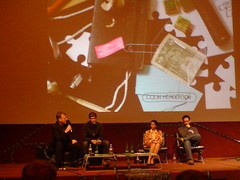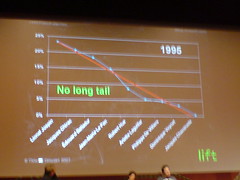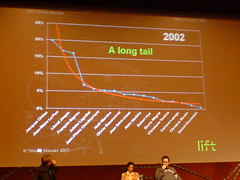LIFT07: Panel: The user/citizen centered society
 LIFT07: Panel: The user/citizen centered society
LIFT07: Panel: The user/citizen centered society
Moderator: Bruno Giussani
Robert Scoble, Podtech
Beth Krasna, Independent Board Member
Thierry Crouzet, writer, BonWeb.com
Derek Powazek, founder, JPG magazine
RS: talking about John Edwards. On his plane, he had me, him, a video guy, a photographer posting to Flickr, a blogger writing (and also reading TechMeme, etc. to track the conversations), a strategist, and an advance guy. UGC has been brought into campaigns. Everyone in this room has the ability to spread an idea worldwide in a few hours.
TC: Politicians don't understand the net and they fear it.
BG: Thierry, you're involved with the long tail of politics.
TC: (Talking about The French Paradox) More TV = more abstention in elections. Shows a graph linking rise in TV viewing to rise in abstention rates. Shows another chart: number of party members has been rising slightly as number of weblogs grows. The hypothesis is that blogging has led to a rise in political participation: "the long tail of politics". Compares 1995 elections to 2002 - very different distribution of votes amongst candidates.
(Is this driven by a desire to become politically engaged in more ways, or by dissatisfaction with the major parties - i.e. is it a push to the right of the curve, or a pull from the left?)
BG: So politics is getting broken up just as music has been?
RS: The Internet can present choices better than old media. Old media can only present 3 candidates.
TC: Politicians want to be alone on-stage.
RS: Big media doesn't like it because they see their audience erode into long tail. Generally politicians are good at dealing with the crowd, so the good ones will handle it.
D: "When the going gets weird, the weird go pro" is the subtext for this talk. Design matters - when you look as good as the mainstream media you get taken as seriously. We're combining the magazine and art businesses, which are both elitist. The internet lets us run around the walls these businesses set up around themselves. We let anyone submit an article under a theme and users vote on them. We had 7000 submissions from the last issue and printed 100 - competition is furious. Media is increasingly participatory - soon media you can't participate in will be boring. We make money via ads and subscriptions. We pay photographers $100 per photo and a free subscription. We "tolerate" professionals.
BG: Much of UGC is about constraining people into a theme.
D: If anyone ever says to you "it's like Wikipedia for X", they're doomed. People don't want to make things for you, you give them an opportunity to create and thank them: "internally design for selfishness".
BG: You're not going to kill professional photographers?
RS: No, we'll still need professionals, people skilled at telling stories through photography will still rise to the top. Maybe not by selling cover images to Time Magazine for $50k, but still...
Q: As a journalist, I'm concerned. The conversation just went from "do we need professional photographers", to a business model. I like bloggers - they're a crucial part of the community. Pros do a separate job. Interns, say, have a writing background but don't know about copyright issues.
(comment from backchannel: "we need spam filters in the mics")
Q: I don't buy this is a big shift.
BK: It's faster and there's more out there.
RS: Look at the way we can reference YouTube videos here.
BK: It's because of the internet, things move faster.

